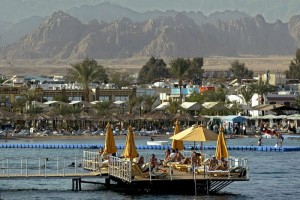
(AFP Photo)
By Lamia Nabil
Legal advisor of the real estate division at the Egyptian Tax Authority (ETA) Anwar Farag confirmed that the they will apply a real estate tax on tourist facilities starting from next July.
The tax has been postponed for the last five years.
Farag also added that the ETA has not specified the evaluation criteria for taxable real estate assets in the tourism sector. It is not clear whether the tax will be applied based on property use, size, or location.
These criteria, he said, will be determined after an open discussion with Minister of Tourism Hesham Za’azou, members of tourism chambers, and owners of hotels and other tourist facilities.
These evaluations will take into consideration the tourism sector’s “current situation”, he said, and will only be applied to the buildings and not to any related components or assets.
“This is definitely not the right time to apply such a tax,” said Vice Chairman of the tourist hotels division at the Cairo Chamber of Commerce (CCC) Nagy Erian. “We don’t have guests, and the tourism sector has come to a virtual standstill since the revolution.”
“Hotels have some tourists, but they are selling their services at a loss in order to retain staff,” he added. “What the tax authority is doing is not right and this doesn’t happen anywhere else in the world. When it does, it is not applied according to market rates, but through a thorough evaluation of the buildings themselves and the land they are built on.”
“We are now left with nothing. Figures for the tourism sector show it currently employs between 1.4 million to 1.5 million workers in terms of direct labour, which decreased from 1.8 million after the departure of seasonal workers. There are about 2 million employees in indirect labour as well,” he said.
“Before the revolution, employment numbers in the tourism sector accounted for 12% of Egypt’s total manpower,” he added.
The CCC’s next step will be to hold meetings with the minister of tourism and the minister of finance “within the coming ten days” according to Erian.
“We are not fully against this decision,” he clarified. “What we ask, though, is for it to be implemented in the right way and at the right time. The sector is going through a critical period right now, and with this decision, the impression we are getting is that the government is simply trying to collect money from us.”
He added: “The banks are currently refusing to finance us, and we have other problems; the fuel situation is another crisis in itself. The government is killing the industry, and they are killing its current investments of EGP 3bn.”
The ETA has ended its assessment of potentially taxable facilities in the sector, with the total now reaching 40 million units, including 140,000 factories and all tourist facilities in Sharm El-Sheikh, the Red Sea, Luxor, Aswan and the North Coast, reported the state-run news outlet Al-Ahram.
Vice Chairman of Hotel Facilities at the CCC Hany Al-Sha’er also criticised the decision. “This is a hasty measure from the government, particularly at this critical time,” he said. “They should wait until next year to make this decision.”
“Although all hotels and tourist facilities are now making discounts to tourists, there is virtually no demand for Egypt these days in the international tourism market.”
“The government has to give priority to the tourism sector,” he added. “Our situation is very critical, especially in Upper Egypt in places like Luxor and Aswan. In the Red Sea area occupancy rates are not higher than 30%.”




